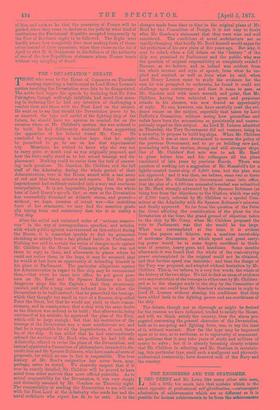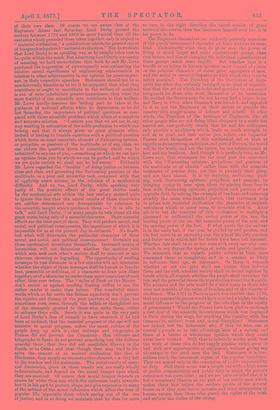THE ENGINEERS AND THE STATESMEN. L ORD DERBY and Mr. Lowe,
like many other able men", fall a little too much into that mistake which is the - exact opposite of professional self-glorification,—extravagant admiration of achievements which are as different as it is possible for human achievements to be from the achievements of their own class. Of course we are aware that at the Engineers' dinner last Saturday, Lord Derby praised the century between 1770 and 1870 as more fruitful than all the centuries which preceded them taken together, only in respect to "material civilisation," a qualification which the printed report of his speech misprinted "national civilisation." Nor do we doubt that Lord Derby in so speaking was, as he usually takes care to be, quite within the mark. But admitting Lord Derby's accuracy of meaning, we hold nevertheless that both he and Mr. Lowe produced the impression of extravagantly over-estimating the relative moral significance of engineering achievements in relation to other achievements in our opinion far more import- ant, in their respective speeches. Statesmen should not be so mischievously humble as to let it be supposed that what they contribute or ought to contribute to the welfare of mankind is not of even indefinitely greater importance, than what the most fruitful of the scientific arts contribute to that welfare. Mr. Lowe hardly deserves the leading part he takes in the guidance of national affairs, when he depreciates, as he did last Saturday, the importance of political questions as com- pared with those scientific problems which admit of a complete and accurate solution. "I assure you that we are not in any way wanting in estimation of the noble profession to which you belong, and that it always gives us great pleasure when, instead of having to trouble ourselves with a political question which turns on some uncertain element of fluctuating opinion, or prejudice, or passions of the multitude, or of any class, we can reduce the question down to something which can be submitted to any one of you,—something on which we can have an opinion froni you by which we can be guided, and by which we are quite certain we shall not be led astray." Evidently Mr. Lowe regarded the "trouble" of doing justice as between class and class, and governing the fluctuating passions of the multitude, as a poor and unworthy task, compared with that of applying exact science to the solution of a mechanical difficulty. And so, too, Lord Derby, while speaking very justly of the positive effects of the great strides made by the mechanical arts within the last century, seemed quite to ignore the fact that the moral results of those discoveries are neither determined nor determinable by reference to the scientific insight which produced them :—" It is idle to talk/' said Lord Derby, "as many people do talk about all the great works being only of a material character. Their material effects are the least part of them. They will produce moral, and social, and political consequences, the importance of which it is impossible for us at the present day to estimate." No doubt, but what will determine the particular character of these moral, and social, and political consequences? Certainly not these mechanical inventions themselves. Increased means of locomotion will not determine whether the motives with which men seek each other's society shall be innocent or mis- chievous, elevating or degrading. The opportunity of sending messages to vast distances in a few minutes will not determine whether the object of those messages shall be honest or fraudu- lent, peaceable or seditious, of a character to draw men closer together, or of a character to renderthem more suspicious of each other, than ever before. The "miles of Dock on the Mersey" don't seedre us against sending floating coffins to sea, but rather render it easier than before. The wonderful water- works which so far outdo the Roman aqueducts don't prevent the squalor and disease of the poor quarters of our cities, but sometimes even seem, through the selfish or thoughtless use of the monopoly granted to those who make them, rather to enhance these evils. Surely it was quite in the very path of Lord Derby's line of remark to have observed, if he had been so inclined, that the material progress of the age will not minister to moral progress, unless the moral culture of the people keep up with it ; that railways and telegraphs in France did not prevent the Commune ; that railways and telegraphs in Spain do not prevent something very like hideous anarchy there ; that they did not annihilate Slavery in the South, or in Cella; and that though they may tend to dis- solve the cement of an ancient civilisation like that of Hindostan, they supply no reconstructive element, —a duty left to the teacher and the statesman. The moral results of mate- rial discoveries, great as these results are, are really wholly indeterminate, and depend on the moral temper upon which they are received. Of course that moral temper depends on causes far wider than any which the statesman really controls, but it is his part to protect, shape, and give expression to many of the noblest of the moral influences which affect the tone of popular life, especially those which spring out of the eve of Justice, and in so doing we maintain that he does far more
to turn in the right direction the moral results of great material discoveries than the discoverer himself ever has it in his power to do.
The Engineers themselves are evidently perfectly conscious of the purely instrumental character of their services to man- kind. Undoubtedly what they do gives men the power of living in much larger and more concentrated groups than ever before, and also of changing the individual constituents of these groups much more rapidly. But whether that is a benefit or an injury to human interests must depend of course on the political character of these great aggregates of men, and the social or unsocial dispositions with which they tend to infect mankind. The President of the Institution of Engi- neers the other day certainly indulged in no kind of supersti- tion that the art to which he is devoted provides its own moral safeguards for those who avail themselves of its inventions. He scolded the Government for not having had a larger Army and Navy in 1864, when Denmark was invaded, and appealed to it to put the Engineers on their mettle to provide the country with ample means of defence and attack. In other words, the President of the Institute of Engineers, like all other people who are not doing blind obeisance to a noble but narrow art, sees perfectly clearly that he and his colleagues only provide a machinery which lends as much strength to evil as to good, and that unless just, sedate, and impartial Powers avail themselves of this mechanical aid at least as eagerly as do imperious, ambitious, and part' al Powers, the world will be the worse, and not the better, for the achievements of him and his brethren. And though it is perfectly true, as Mr. Lowe says, that statesmen for the most part are concerned with the fluctuating opinions, prejudices, and passions of the multitude or of classes," rather than with the scientific treatment of precise data, yet that is precisely their glory, and not their shame. It is by studying, restraining, guid- ing, such fluctuating opinions, prejudices, and passions, by bringing equity to bear upon them, by placing them face to face with fluctuating opinions, prejudices, and passions of an opposite drift, by setting the example of candour, and enforcing steadily the same even-handed justice, that statesmen help to infuse into material civilisation the character of intrinsic usefulness which so many seem to associate with it. After all, it is but the function of this civilisation to multiply a thousand or millionfold the seeing power of the eye, the hearing power of the ear, the muscular power of the arm, and the moving power of the feet. If what meets the eye and ear is in the main bad, if the arm be guided by evil passion, and the feet move to an unworthy aim, the arts of life only quicken and foster seeds which had far better have been left dormant. Whether this shall be so or not rests with every one who com- mands in any degree the springs of noble and ignoble motive. We maintain that as regards public actions at least, none command these so completely and in a manner so likely to influence their age, as statesmen. On them it depends whether or not the poor shall see justice done between them and the rich, whether society shall be bound together by bonds which all respect, whether the people shall reverence the law, and the powerful throw their protection round the humble. The sciences and the arts would be a mere curse to those who were not sensible of the value of freedom and of the dignity of obedience. Was 1871 in Paris so much less terrible than 1793, that any reasonable person would have ascribed a higher intrinsic moral influence to the progress of the arts than to the equity of government ? Would not France have been glad to exchange a vast deal of the scientific inventiveness which was displayed in Paris during the siege, for anything like equality with the Germans in mutual trust and moral discipline ? Statesmen are indeed but the helmsmen who, if they be wise, can so control a people as to take advantage here of a current and there of a breeze of wholesome opinion which they could never have created. Still, that is infinitely nobler work than the work of those who do but supply popular tastes, good or bad, with new opportunities of enjoyment, without giving any advantage to the good over the bad. Statesmen, it is true, seldom touch the innermost region of the popular conscience. They can appeal only to the conception of public responsibility or duty. Still there never was a people yet with a high sense of public responsibility and public duty in which the private conscience was quite inert ; and we are quite satisfied that it is but a temporary illusion on the part of our public men which makes them bow before the modern priests of the natural forces as if they were better servants and truer interpreters of human nature, than those who guard the rights of the weak and enforce the duties of the strong.



































 Previous page
Previous page